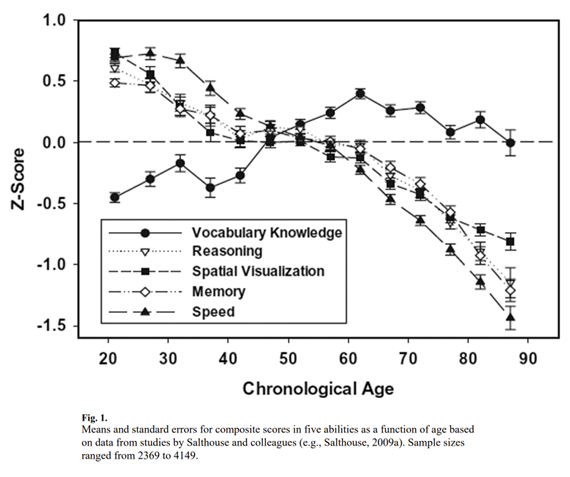Natural ageing and cognition
- 02 Dec 2023
- 1 Minute to read
- Print
- PDF
Natural ageing and cognition
- Updated on 02 Dec 2023
- 1 Minute to read
- Print
- PDF
Article summary
Did you find this summary helpful?
Thank you for your feedback
It should be noted that some areas of cognition decline naturally with age, others are maintained. A consideration of these changes is provided here.
What is maintained?
- Immediate memory of spoken words.
- Vocabulary remains stable.
- Object perception. The ability to recognise familiar objects.
- Spatial perception. The ability to appreciate the physical location of objects.
- Ability to appreciate similarities, describe the meaning of proverbs and reasoning around familiar objects.
Although the following decline, they should not interfere with day to day life:
- Processing speed. This declines from the third decade of life and affects verbal fluency.
- Attention. Complex attention tasks such as engaging in conversation in a crowded room or multitasking such as talking on the phone whilst making a meal declines.
- Language. Visual confrontation declines, where one is given an object and asks to name it -remains until 70 and then declines.
- Visual construction. For example, the ability to put together flat-pack furniture.
- Executive functioning. Concept formation, abstraction and mental flexibility decline with age, particularly after 70 years. Older adults tend to think more concretely.
- Response inhibition. Decreased ability to inhibit an automatic response in favour of a novel one.
- Inductive reasoning. Verbal and mathematical tasks declines from around age 45 years. Reasoning with unfamiliar objects declines with age.
Findings from the Study of Women across the Nation (SWAN) suggest that there is a small (but probably perceptible to the woman) decrement in perimenopausal cognitive performance that resolves in post menopause.

References and Further Information:
- Salthouse T. Selective review of cognitive aging. Journal of the International Neuropsychological Society. 2010.
- Harada C, Natelson Love M, Triebel K. Normal Cognitive Aging. Clin Geriatr Med 2013.
- Greendale G, Huang M, Wight R et al. Effects of the menopause transition and hormone use on cognitive performance in midlife women. Neurology 2009.
Was this article helpful?

